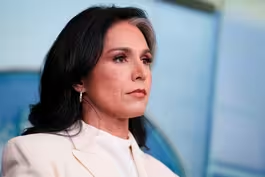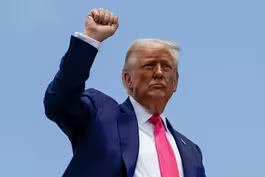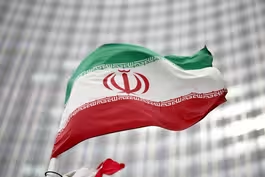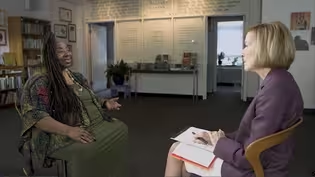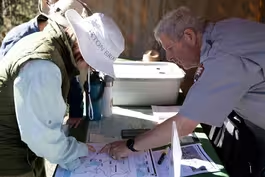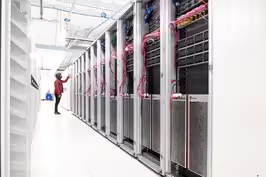
What the new trade deal with Japan means for the U.S.
Clip: 7/23/2025 | 6m 30sVideo has Closed Captions
What the new trade deal with Japan means for U.S. businesses and consumers
The U.S. and Japan announced a trade agreement that President Trump hailed as a significant victory for American companies and consumers. In return, he said the U.S. won’t impose 25% tariffs on Japan at the end of this month. William Brangham discussed the details with Kate Kalutkiewicz of McLarty Associates, an international trade consulting firm.
Problems playing video? | Closed Captioning Feedback
Problems playing video? | Closed Captioning Feedback
Major corporate funding for the PBS News Hour is provided by BDO, BNSF, Consumer Cellular, American Cruise Lines, and Raymond James. Funding for the PBS NewsHour Weekend is provided by...

What the new trade deal with Japan means for the U.S.
Clip: 7/23/2025 | 6m 30sVideo has Closed Captions
The U.S. and Japan announced a trade agreement that President Trump hailed as a significant victory for American companies and consumers. In return, he said the U.S. won’t impose 25% tariffs on Japan at the end of this month. William Brangham discussed the details with Kate Kalutkiewicz of McLarty Associates, an international trade consulting firm.
Problems playing video? | Closed Captioning Feedback
How to Watch PBS News Hour
PBS News Hour is available to stream on pbs.org and the free PBS App, available on iPhone, Apple TV, Android TV, Android smartphones, Amazon Fire TV, Amazon Fire Tablet, Roku, Samsung Smart TV, and Vizio.
Providing Support for PBS.org
Learn Moreabout PBS online sponsorshipAMNA NAWAZ: The U.S. and Japan announced they have reached a major trade agreement.
President Trump hailed the breakthrough as a significant victory for American companies and consumers.
In return, he said the U.S. won't impose punishing 25 percent tariffs on Japan at the end of this month.
William Brangham has more.
WILLIAM BRANGHAM: While the exact text of the Japan deal has not been released, President Trump says Japan has agreed to open its markets more to American cars and trucks, as well as rice and other agricultural products.
It also agreed to invest $550 billion in the U.S.
In exchange, the U.S. will not impose its threatened 25 percent tariffs on Japanese goods coming to America.
Those will instead be set at 15 percent.
So, for more on what this deal means, we are joined by Kate Kalutkiewicz.
She's senior managing director at McLarty Associates, which is an international trade consulting firm.
Kate, thank you so much for being here.
Again, as I said, we don't really know the granular details of this deal.
But is it, as President Trump has said, a major opening of the Japanese market to American goods?
KATE KALUTKIEWICZ, Senior Managing Director, McLarty Associates: Well, as you say, we don't have all the details.
It does represent -- if we take the president as his word, it represents some significant market wins that he's been seeking, notably on U.S. agriculture, which the Japan market has notoriously been closed to U.S. goods, as well as some important commercial purchases such as airplanes.
WILLIAM BRANGHAM: So the sectors -- tell me a little bit more about the sectors that might benefit most from this.
KATE KALUTKIEWICZ: Well, it appears that the president was successful in attaining some concessions from the Japanese on rice.
This was a sector, of course, of top interest.
The rice market in Japan is quite protected.
They allow a certain amount of rice to enter the market without paying tariffs.
But once they hit this quota, tariff rates exceed 700 percent.
This has been a very significant area of interest for the U.S. agricultural community.
So increased access there would represent a fairly significant market opening.
The other sector that the president has sought increased access in is autos.
You have heard the president talk over and over about the auto sector, in particular, his view that the Japanese market is closed to U.S. cars.
Now, it's notable that the U.S. car market is not impacted by tariffs.
The Japanese famously don't charge tariffs on vehicles coming into the market, but they maintain really significant regulatory differences, which have really impeded the access and growth of the U.S. auto sector in Japan.
So commitments to relax or to adjust some of those regulations could also be meaningful to the U.S. auto sector.
WILLIAM BRANGHAM: So this would seem to support the argument that the president has always made that he threatens tariffs in order to force other nations to bring down what he argues are unfair tariffs on American goods.
KATE KALUTKIEWICZ: That's true.
And I think if we look at the range of trade negotiations that the United States is currently engaged in, you really can divide those into markets that are quite developed like Japan, the E.U., the U.K., Korea.
These are markets that don't employ very high tariffs, but have very high regulatory challenges for the United States.
The other group of trade negotiations are happening with countries like Indonesia or Vietnam, which do have exceptionally high tariffs.
The president in his agreements with those nations has succeeded in lowering those.
So it's all about the different types of barriers to access, but the president has been quite clear he wants U.S. firms to be able to sell more into these markets, and it does seem like he's achieving that.
WILLIAM BRANGHAM: The president also said that the Japanese have agreed to invest or basically purchase $550 billion of U.S. products.
What are those purchases likely to be, and then who might be making those purchases?
KATE KALUTKIEWICZ: Yes, there are two interesting provisions that we have heard the president talk about.
I think the $550 billion refers to an investment fund, which is quite novel, and I think we don't have all the details there.
Secretary Lutnick, the secretary of commerce for the United States, has come out today saying this will be essentially a finance fund alone from the Japanese government to finance investments in the United States.
I will look forward to getting more detail on that.
The other part of this are these purchases that you referenced, and these are purchases of Boeing planes, of weapons.
These have a dual purpose, I think, in terms of both offsetting the trade deficit, which is the interest of the president, selling U.S. commercial goods of interest, but also the defense sector and defense burden-sharing with our allies has also been a key issue of interest.
And so this likely satisfies the president's interest in Japan committing more to its defense.
WILLIAM BRANGHAM: On the automobiles part that you mentioned before, some American automakers have expressed displeasure about this deal.
Do you -- help us understand, what is their concern?
KATE KALUTKIEWICZ: Well, their concern is that the president several months ago imposed a different set of tariffs on autos and auto parts.
These are tariffs that are related to national security.
They are intended to promote reshoring of manufacturing in the United States' auto sector.
Those tariff rates were set at a global level at 25 percent.
So U.S. auto manufacturers are concerned that, as part of this negotiation, Japan's competitors will have preferential access to the United States at a 15 percent tariff rate.
So I assume what they're concerned about is that, if we award preferential access to foreign automakers, we will erode the protections that the president sought to create for the U.S. manufacturers under these other tariffs.
WILLIAM BRANGHAM: All right, that is Kate Kalutkiewicz of McLarty Associates.
Thank you so much for your help getting us through all of this.
KATE KALUTKIEWICZ: My pleasure.
Thank you for having me.
Gabbard sows doubt on Russia probe as Trump faces pressure
Video has Closed Captions
Clip: 7/23/2025 | 5m 36s | Gabbard pushes report on Obama and Russia probe as Trump faces pressure over Epstein (5m 36s)
GOP and Democratic strategists on Trump's Epstein connection
Video has Closed Captions
Clip: 7/23/2025 | 7m 55s | GOP and Democratic strategists analyze renewed focus on Trump's connection with Epstein (7m 55s)
Iran will continue uranium enrichment despite U.S. strikes
Video has Closed Captions
Clip: 7/23/2025 | 1m 30s | Iran says it will continue uranium enrichment despite U.S. strikes on nuclear facilities (1m 30s)
Loretta Ross explores a new way to face disagreements
Video has Closed Captions
Clip: 7/23/2025 | 8m 8s | 'Tell me more': Activist Loretta Ross explores a new way to face disagreements (8m 8s)
National parks struggle with funding and staffing cuts
Video has Closed Captions
Clip: 7/23/2025 | 8m 51s | How the National Parks Service is struggling with drastic funding and staffing cuts (8m 51s)
News Wrap: Aid groups warn of starvation and death in Gaza
Video has Closed Captions
Clip: 7/23/2025 | 7m 38s | News Wrap: Aid groups warn of 'chaos, starvation and death' in Gaza (7m 38s)
What's in Trump's new AI policy and why it matters
Video has Closed Captions
Clip: 7/23/2025 | 6m 37s | What's in Trump's new AI policy and why it matters (6m 37s)
Providing Support for PBS.org
Learn Moreabout PBS online sponsorshipSupport for PBS provided by:
Major corporate funding for the PBS News Hour is provided by BDO, BNSF, Consumer Cellular, American Cruise Lines, and Raymond James. Funding for the PBS NewsHour Weekend is provided by...
